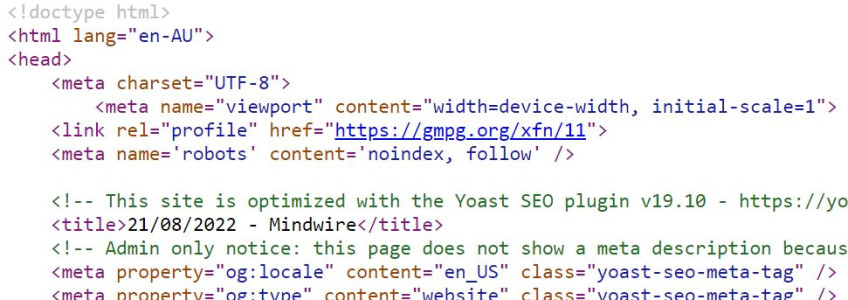
If you're a WordPress user, you might be wondering if it's a good idea to add no-index tags to your blog archives. In short: yes. Adding the tag will prevent search engines from indexing your archive pages, which is especially helpful if you've used Archive pages as landing pages for posts. In this article, we'll explain why adding no-index tags to your blog archives is such a good idea.
Duplicate Content is a big no-no
Duplicate content is when a page has the same content as another page.
While it may seem like this doesn’t matter, duplicate content can actually cause problems for your site’s SEO. If people search for a keyword on Google and then go to one of your pages, they may have already found what they were looking for elsewhere. As a result, they won’t click through on your link or come back to visit you again later.
To prevent this from happening, you need to no-index new posts in archives so that old posts aren't being indexed and displayed instead.
Sending Mixed Signals to Search Engines
Search engines are not very good at understanding context. If you have a blog post about Brett Kavanaugh, for example, and you want to add an archive page for each month that you published your posts on this topic, Google will treat them all as if they were individual posts.
Google does recognize that there may be multiple versions of the same content on your site, but it uses heuristics (rules) to determine which version is best suited for indexing. This means that if you want to make sure all of your archives are no-indexed so search engines don't crawl them when viewing your main blog pages in the SERPs (search engine results pages), then this method will work well for you!
If you're looking for more information about how Google handles crawling and indexing dynamic sites like WordPress blogs and webpages built with JavaScript frameworks such as ReactJS or VueJS please read our article titled A Beginner’s Guide To SEO For JavaScript Developers which covers everything from basic principles like device detection through advanced topics like canonicalization practices used by major websites today including Facebook & Apple Inc., two companies who employ thousands of engineers working around-the-clock just keeping track stuff gets indexed correctly so everyone can find what they're looking without wasting any time searching through irrelevant results!
No indexing your archive pages will prevent duplicate content within your site.
By adding a no-index to your archive pages and posts, you will prevent duplicate content within your site. Duplicate content is not a good thing because Google doesn't like it and it can lead to lower rankings. The reason why we say "archive page" instead of just "page" is that some websites have their "page" as the main page and then they have an archive of other posts on separate pages that are only accessible by clicking on a link in the sidebar or footer area. The point here is that when someone clicks on any post from these archives, it will be treated as new content by Google and therefore will not be indexed automatically when crawled.
The no-index tag is is an important tweak to make sure that your blog archives don't get indexed by search engines and duplicate content isn't created. However, it's important not to go overboard with this technique as there are some downsides such as potential loss in traffic if someone wants an older post on their site.